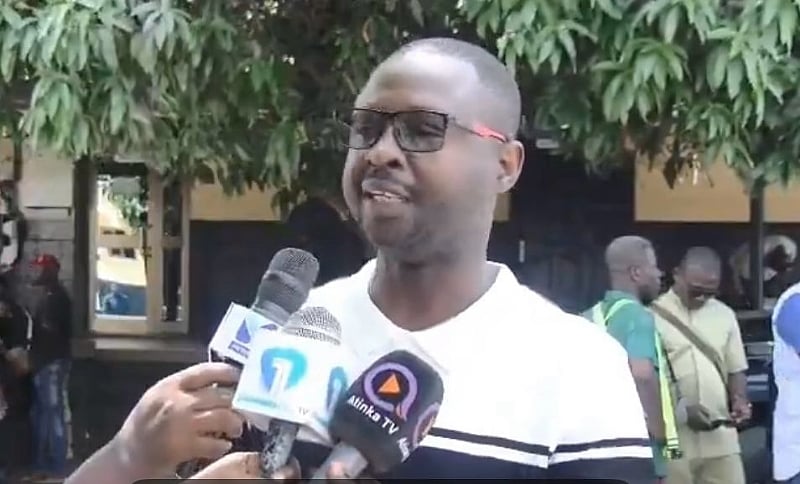The political landscape of Ghana has been ignited by the suspension of Chief Justice Gertrude Esaaba Torkornoo, a move that has drawn sharp criticism from opposition parties and sparked concerns about the integrity of the nation’s democratic institutions. Jerry Owusu Appauh, General Secretary of the Liberal Party of Ghana (LPG), has vehemently condemned the ruling National Democratic Congress (NDC) government, accusing them of dismantling the very foundations of Ghana’s democracy. He argues that the NDC, having secured power with only a fraction of the total votes cast, lacks the mandate to impose such a drastic measure, especially one that appears to undermine the independence of the judiciary. This sentiment resonates with a broader concern about the potential for a minority government to exert undue influence on key state institutions, potentially leading to an erosion of democratic principles and the rule of law.
Owusu Appauh’s declaration that the LPG will not remain passive underscores the growing resistance to the suspension. He has pledged to mobilize the party’s support and collaborate with other opposition groups to stage protests against what they perceive as an unconstitutional act. The emphasis on the numerical disparity between the NDC’s voter base and the overall population serves to highlight the perceived illegitimacy of the government’s actions. The implication is that a government elected by a minority should not have the power to make decisions that affect the entire nation, particularly decisions that appear to subvert established legal processes and potentially compromise the balance of power. This concern is further amplified by the assertion that even some NDC supporters disapprove of the Chief Justice’s suspension, suggesting a wider discontent that transcends party lines.
The opposition’s planned protests signify a growing movement to challenge the NDC’s authority and defend the independence of the judiciary. The repeated calls for street demonstrations indicate a determined and sustained effort to apply pressure on the government and force a reversal of the suspension. The LPG’s insistence on resisting what it sees as an authoritarian overreach reflects a commitment to uphold democratic principles and safeguard the integrity of Ghana’s legal system. The strong language employed, including the promise to compel the President to revoke his action, highlights the seriousness with which the opposition views this issue and their resolve to fight against perceived injustices.
The suspension of Chief Justice Torkornoo has galvanized opposition parties, with the New Patriotic Party (NPP) joining forces with the LPG, National Democratic Party (NDP), and the People’s National Party (PNP) to form a united front against what they consider a blatant disregard for the rule of law. This coalition underscores the shared concern about the implications of the government’s actions and the potential erosion of democratic norms. The collective action by these parties represents a significant challenge to the NDC’s authority and demonstrates a growing political momentum against the suspension. The combined strength of these opposition parties could exert considerable pressure on the government and potentially influence the trajectory of the ongoing political crisis.
The opposition’s core argument revolves around the principle of judicial independence, a cornerstone of any functioning democracy. They contend that the suspension of the Chief Justice, based on what they view as questionable grounds, constitutes a direct attack on this fundamental principle. The claim that the process leading to the suspension was flawed and lacked transparency further fuels their concerns about due process and fairness. The opposition argues that the government’s actions not only undermine the authority of the judiciary but also create a chilling effect on judicial decision-making, potentially influencing judges to favor the government out of fear of reprisal. This, they argue, sets a dangerous precedent that could have long-lasting consequences for the rule of law in Ghana.
The opposition’s characterization of the suspension as a “calculated attempt to undermine judicial independence” reflects a deep distrust of the government’s motives. They see the move as part of a broader strategy to consolidate power and control key state institutions. This perception is fueled by the belief that the government is using the petitions against the Chief Justice as a pretext to remove her from office. The swiftness with which the suspension was implemented, following the establishment of a prima facie case, further strengthens their suspicion that the process was predetermined. The lack of detailed information about the specific allegations against the Chief Justice also contributes to the perception of a lack of transparency and raises concerns about the fairness of the process. The opposition’s stance is that the suspension is not about accountability but rather a politically motivated move designed to weaken the judiciary and consolidate the NDC’s grip on power. This narrative underscores the broader political tension between the ruling party and the opposition, with the judiciary becoming a battleground in their ongoing struggle for control. The outcome of this conflict could have profound implications for the future of democracy in Ghana.














